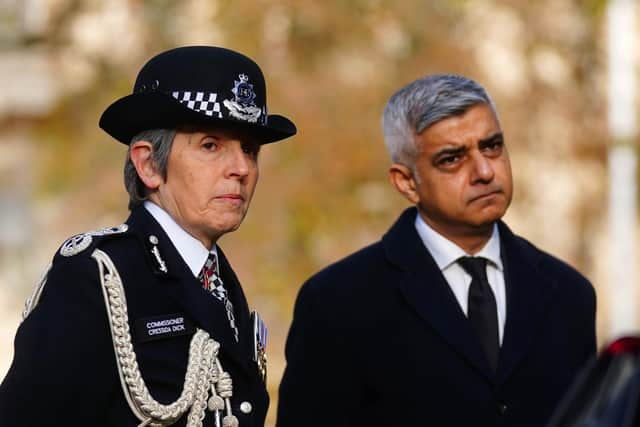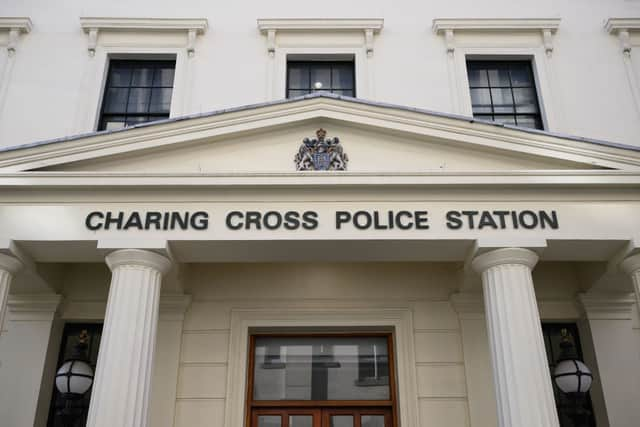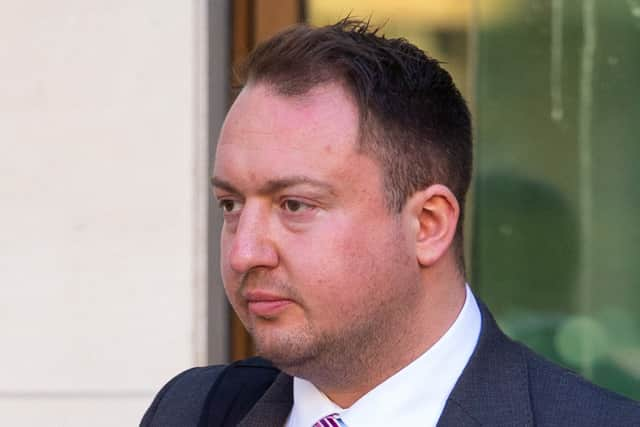Revealed: Only ONE Met Police officer sacked from force despite 53 cited by IOPC for misconduct
and live on Freeview channel 276
Out of the 53 Met Police officers cited for misconduct by the police watchdog over a three-year period - only one was dismissed from the force.
The BBC analysed annual outcome reports from when the Independent Office of Police Complaints (IOPC) was formed in 2018 to 2021, and shared the figures with partners such as LondonWorld.
Advertisement
Hide AdAdvertisement
Hide AdThis judges whether cases are “proven” and then sanctions the officer, with these ranging from dismissal from the police to no further action.
And in the case of the Met, only one officer was sacked after an IOPC investigation - with critics blasting the police complaints system as “broken” and “powerless”.
Between 2018 and 2021, the IOPC found 53 officers and 11 police staff had a case to answer for misconduct.


Advertisement
Hide AdAdvertisement
Hide AdHowever, at the police tribunal, the force panel decided 13 officers and three staff faced no further action.
One of these cases involved an officer in east London, accused of forcing a man’s head against a brick wall during a arrest in May 2017, which cut the suspect.
The IOPC submitted a file to the Crown Prosecution Service, who was initially convicted of common assault, before being acquitted at a retrial after appeal.
At his gross misconduct hearing, the panel was not satisfied “that any contact between the man’s head and the wall was deliberate and caused directly by the officer’s actions” and so no further action was taken.
Advertisement
Hide AdAdvertisement
Hide AdThe BBC figures showed that 23 officers and six staff were given a management action, and 16 officers and three staff were given a written warning.
One of the officers was given a management action for starting a sexual relationship with a domestic violence victim, after the investigation finished.
And just one Met Police officer was dismissed, and being cited for misconduct by the IOPC.


This was Det Con Mark Eve, based in Romford, Havering, who was found guilty of using racist language in person and via Whatsapp, carrying a knuckleduster while on duty and drinking on the job.
Advertisement
Hide AdAdvertisement
Hide AdHe also tampered with evidence from a burglary investigation, roguely interviewed as suspect at his home and stole a personal photo from a female colleague, and sent it to a fellow officer.
Two officers would have been dismissed if they were serving when the IOPC investigated them.
Former PC James McLoughlin-Goodchild and another constable were investigated as part of the watchdog’s probe into behaviour at Charing Cross police station.
McLoughlin-Goodchild was found guilty of bullying and harassing a colleague, making derogatory comments about women, domestic abuse and prostitution and using racially offensive language at a Christmas party.
Advertisement
Hide AdAdvertisement
Hide AdHe would have been sacked, but he had already been dismissed by the Met prior to the IOPC investigation, after being convicted in court of threatening to murder a female colleague.
The other officer had resigned before he could be dismissed.


Ken Fero, an award-winning documentary maker and political activist, commented: “The only meaningful measure of whether the IOPC has been effective is - whether their work has in any way been successfully used to prosecute a police officer for use of violence and the answer is no.
Advertisement
Hide AdAdvertisement
Hide Ad“There’s never been a situation where the work of the Police Complaints Authority [a precursor], IOPC has been taken to an inquest and that has resulted in a successful prosecution.
“The only three prosecutions that we’ve had as a result of a death of a member of the public have been in the cases of Sarah Everard, Dalian Atkinson and Henry Foley, which was a case from the 1980s.
“The PCA, the IPCC [the IOPC’s precursor] and the IOPC are a fundamental part of the failure of the state to hold officers to account.
“The data you have really supports what the families have been saying for a long time which is that the system is broken.”
Advertisement
Hide AdAdvertisement
Hide AdThe Home Affairs Select Committee launched a new inquiry into the effectiveness of the IOPC at the start of 2021.
Deborah Coles, executive director of the charity Inquest, said that sanctions against police officers were too rare and the lack of punishment risked undermining confidence in policing.
This criticism, she said, also extended to the fact that very few serving police officers had faced criminal proceedings for alleged offences carried out in the line of duty.
IOPC director Kathie Cashell said the reason so many officers did not face further action could be because misconduct panels require a higher threshold than the watchdog’s investigators.
Advertisement
Hide AdAdvertisement
Hide AdMs Cashell explained: “The IOPC will give an opinion as to whether there is a case to answer.
“The panel will then apply a different test, a higher legal threshold, and will come to a view.
“In the new system which we pushed for, if we say there should be a hearing there is one and we have also been given power to present our own cases at that panel.”
“The IOPC is one player in the police complaints system, and with better cooperation we can improve the timeliness of proceedings.
Advertisement
Hide AdAdvertisement
Hide Ad“I think cultural change within the complaint system itself and policing is needed so it is not so defensive when things go wrong.
“We need a police force that is really open to working to resolve those issues, to really listening and to taking the opportunity to learn.”
While the Police Federation said the reason the most serious punishments were rare was because the IOPC too often pursued “vexatious allegations” against its members.
The Metropolitan Police declined to comment.
Comment Guidelines
National World encourages reader discussion on our stories. User feedback, insights and back-and-forth exchanges add a rich layer of context to reporting. Please review our Community Guidelines before commenting.
